
Football: fanaticism, food and philosophy
DETROIT, U.S.A. — Football is hard to ignore. Whether the scores are announced on your city streets or your Facebook timeline, the sport follows you ...
Jul 18, 2014
DETROIT, U.S.A. — Football is hard to ignore. Whether the scores are announced on your city streets or your Facebook timeline, the sport follows you just as avidly as you follow it. For some around the world, this relationship translates into a favorite national pastime. For others, a persistent, and maybe annoying, reminder of the strange and baffling world beyond the Super Bowl. No matter what you think of the sport, there is no denying its ubiquity. When it comes to the World Cup, the numbers are astronomical.
The 2010 World Cup in South Africa earned FIFA, the organizing body, 3,890 million U.S. dollars in revenue. This year, the World Cup had 34.65 million Germans turning on their television for the final match alone — the largest group of viewers the country's television industry has ever seen. Even in the United States, curiosities were piqued and network expectations exceeded with 26.5 million U.S. Americans tuning in for the final match. Facebook has reported that this year the World Cup sparked 3 billion interactions on its website.
As a global phenomenon, the celebration of football remains distinctive to the cultures in which it has been inculcated. The Gazelle asked NYU Abu Dhabi students from different backgrounds how they watched the game, and their answers were telling of a sport that is both incredibly widespread and deeply personal.
Superstitions
"Some of my superstitions cannot be publicly declared or they would be rendered powerless. But there are a few that I can tell. Never try to predict the score or the scorers, just don't. Writing the winning team's name under the sole of the shoe being worn is another one. I think praying is the biggest pre-game tradition I know."
"Pray when you have to, scream when you have to and be quiet when you have to. I do believe that when you are in good company you have a higher chance of winning."
"As the biggest Catholic nation in the world, [in Brazil] religion and soccer are many times intertwined. I was once at a friend’s house watching Brazil play, and his mother made sure that all religious icons and statues in the house were facing the TV."
"If the team I'm rooting for loses, I'll attribute it to something I did that day — be it wear the wrong jersey or not watching the match in a certain place or with specific company."
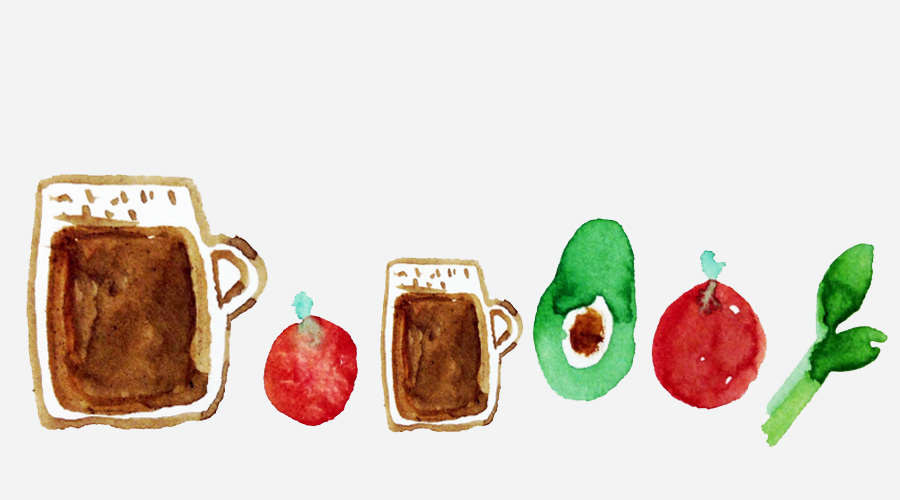
Happy Hour
"A good game of soccer is always accompanied by cold beers and ‘churrasco.’”
"Sausage, beef jerky and fries are very popular here, and I think in most places in Europe."
"I don't have anything in particular I need to eat, but beer can do the trick."
"You should never eat when you watch football. Superstition-wise, it makes your team slower ... In reality, you could choke on the food, you could be so excited and forget the food ... or the food could end up in someone's face."
"I grew up with olives, tortilla de patata, beer, potato chips with lemon and chili, jamón, cheese, nuts. But I will eat before the game or after. If I am eating during the game, it's a bad sign."
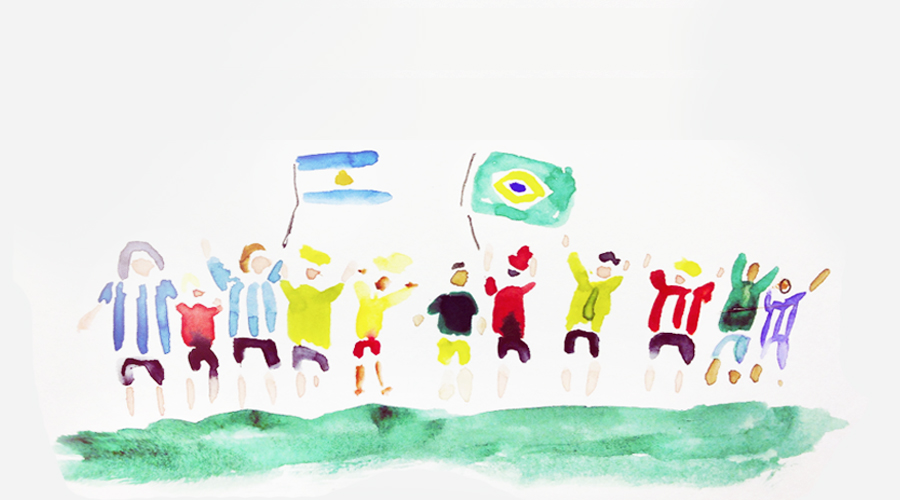
Football Nationalism
"Politically, football plays an important and sometimes unpleasant role [in Jordan] ... It is known that many Jordanians with Palestinian origins support Real Madrid, and [other] Jordanians support Barcelona. This might be problematic because ... the tension between Palestinians and Jordanians is transferred to football."
"The Dutch Eredivisie, or Honor Division, consists of eighteen professional soccer teams that compete for first place annually. The team you support often reveals which city you are from ... [This] enables people to surpass their national identity in order to support their hometowns, complicating the question of what it means to be Dutch."
"My family, like a lot of Palestinian families, is scattered all around the world. We can’t always stay connected, but whenever there is an important match on, we all end up talking to each other about [it]... The first thing I do when I’m watching a match is check Facebook."
"Most of the nations follow matches very closely. I guess that's the political value of soccer here, too. You've gotta be better at it than your neighboring countries."
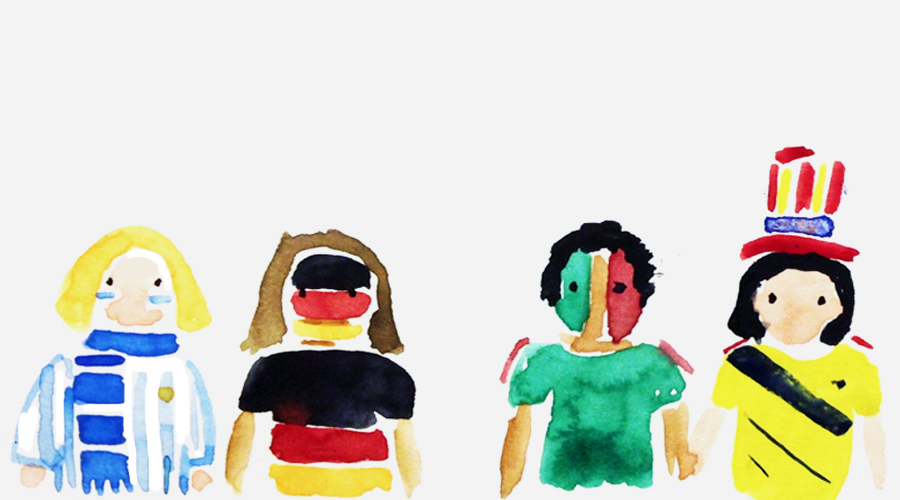
Who We Root For?
"I primarily root for the Netherlands, because support for the Dutch national team was instilled in me at a young age ... The second team I rooted for is Ghana. My mother is Ethiopian, and after living in Botswana, Ethiopia and Tunisia, I also wanted to see one of the African teams make it to the semi finals."
"I root for France because I am French, I grew up in France, and France is a good team so I can expect some good results. Even though I'm also U.S. American, I don't root for the U.S. team, and I actually never root for the U.S. in sports."
"I was rooting for Algeria when they played against Germany. The Algerian team, in my opinion, was representing us Arabs. I am so proud of how well they played."
"I grew up in a country where most people love beautiful Brazilian football. Watching magicians such as Ronaldo play brings me nothing but happiness."
"I think how it works in Jordan and the Arab World, you pick a team when you're a kid and you stick to it. I picked Brazil and Real Madrid a long time ago, and as time passes by [I've developed] a sense of loyalty."
"I was born in Spain and grew up in Spain, but my blood comes from Mexico: My parents are from Mexico, my grandparents are in Mexico ... My roots do come from there, and nothing could make me happier than seeing Mexico win."
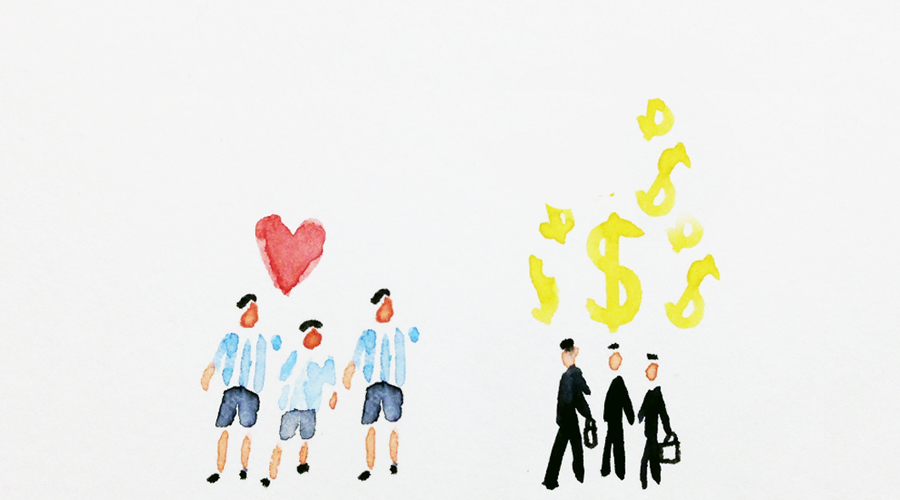
Football Philosophy
"Watching is 100 percent a social activity for us. It brings us together."
"It's less a social activity and more a tradition. People do interact, but it's more the process of being together."
"Football has a way of unifying the most conflicting groups of people — although it can also tear them apart ... Anyone, regardless of income, class and education, can pick up an object to kick around on the street and mark off goal posts. Football is so present in Mexicans' lives that you don't really need extensive technology to keep track of a season's teams."
“Soccer is a very social activity in Brazil. People gather in bars, in homes, in and around the stadiums. I think that this is very important, as it creates a sense of unity in a community, and every match is more fun when you watch it with some friends."
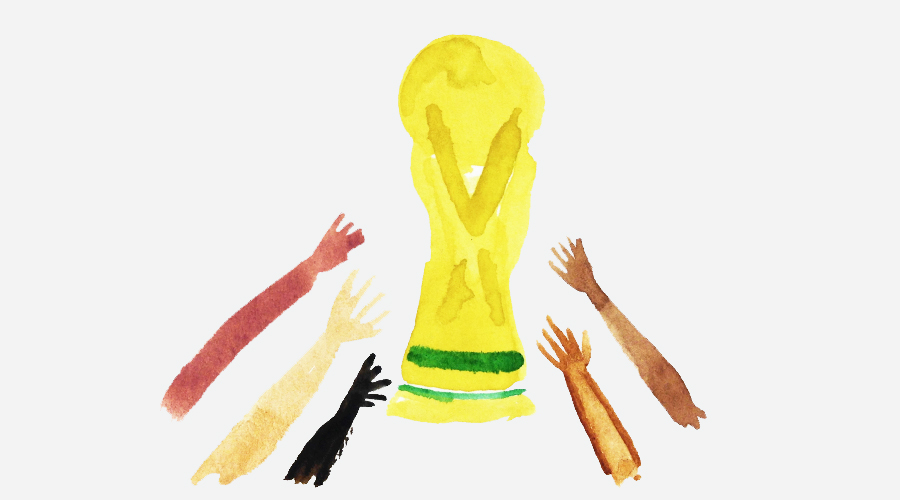
Is Winning Everything?
"Winning [in football] is not necessarily everything. When players give all they've got on the field but still lose, I respect them and do not think of them as losers but as valiant soldiers."
“It definitely isn't. If it was, you wouldn’t have millions of crazed Mexicans supporting our national team full-heartedly even though we have yet to make it to semi finals in a World Cup. Don't get me wrong, we always would like to win. And when we do, the country goes into a standstill while we celebrate.”
"I don't think anyone can analyze football and say it is about this specific thing and that specific thing. Bill Shankly once said, 'Some people believe football is a matter of life and death. I am very disappointed with that attitude. I can assure you it is much, much more important than that.'"
Graphics by Megan Eloise. Interactivity by the Gazelle Web Team.
Zoe Hu is an editor at large. Email her at zoe@thegazelle.org.
related
trending

